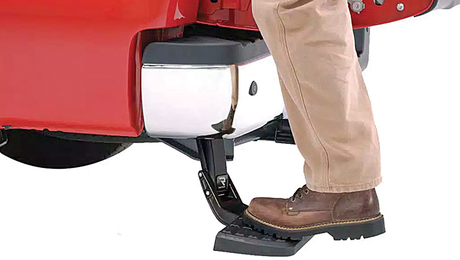I have an oil furnace that supplies my home heat and domestic hot water. The domestic hot water rarely stays hot enough long enough for a good deep bath, plus it seems to use a lot of oil (a gallon a day in the summer when I don’t need the furnace for home heat). I’m considering adding an electric hot water heater and turning the furnace off in the summer. Would it make sense to hook the electric water heater up down the line from the furnace in order to take advantage of the preheated furnace water in the winter?
Discussion Forum
Discussion Forum
Up Next
Video Shorts
Featured Story

The RealTruck AMP Research Bedsteps give you easy access to your truck-bed storage.
Featured Video
Video: Build a Fireplace, Brick by BrickHighlights
"I have learned so much thanks to the searchable articles on the FHB website. I can confidently say that I expect to be a life-long subscriber." - M.K.














Replies
It appears you have a boiler. A furnace heats air, a boiler heats water.
Does your boiler have an indirect hot water tank that it heats for domestic hot water? If not, adding such a tank with a seperate zone valve to heat it would give you all the hot water you need. If so, you might need a larger tank or insulation on the hot water pipes.
Electric DHW is more expensive than oil-fired. It is good to keep your boiler firing in the summer to keep it clean.
I would get a heating contractor to check out your system and advise you on options.
Solar & Super-Insulated Healthy Homes
Yes, I have a boiler, thanks for clarifying. It does not appear to have a separate domestic water tank, just 1/2" copper from the boiler to the faucets. It has only one zone for the whole system and the second floor is cooler than the first in the winter. Should I add a zone for the second floor when I add the domestic water tank (is it a good time, etc.)?
"Electric DHW is more expensive than oil-fired. "How can you say that when electricity runs from less than 5 c/kWh to over 20..
.
A-holes. Hey every group has to have one. And I have been elected to be the one. I should make that my tagline.
Of course, it depends on your local prices and the efficiency of your heating plant.
Electricity tends to be more expensive than end-use fuels because of the outrageous inefficiencies of centralized large-scale generation (on the order of 30-40%).
But the average US electric rate is $0.11/kWH and the average fuel oil cost is $3.33/gal. At those rates, your oil burner would have to be running at less than 75% efficiency for it to equal the cost/BTU of electric heat.
And since the poster didn't indicate location, on average my statement would be true.
Riversong HouseWright
Design * * Build * * Renovate * * ConsultSolar & Super-Insulated Healthy Homes
Edited 2/6/2008 7:05 pm ET by Riversong
running a tankless coil especially, an oil boiler running 75% efficiency for DHW would be a dream come true.-------------------------------------
-=Northeast Radiant Technology=-
Radiant Design, Consultation, Parts Supply
http://www.NRTradiant.com
maxwell,
You can put the water heater closer to where it will be used and experiance less heat loss and faster recovery times.. Remember electric water heaters don't need a exhaust flue.
Maxwell,
Vocabulary clarifications:
--As Riversong pointed out, you have a boiler, not a furnace.
--Your boiler is equipped with a tankless coil; this is an obsolete way to produce domestic hot water from a boiler. Tankless coils require the boiler to fire far more frequently than necessary.
--If you install a separate storage tank, the system is called an indirect water heater system. As Riversong pointed out, such systems usually have a separate circulator controlled by a tank-mounted aquastat. From the boiler's perspective, the hot water tank is just another heating zone. In summer, your boiler will fire far less frequently once you install an indirect tank.
--Recent increases in oil prices have not yet translated into spikes in electricity prices. In the upper Midwest and Manitoba, plenty of people have cheap electricity (sometimes hydroelectric, at least in Manitoba), resulting in rates that allow hot water to be produced cheaper with electricity than oil.
Edited 2/8/2008 5:57 am ET by MartinHolladay